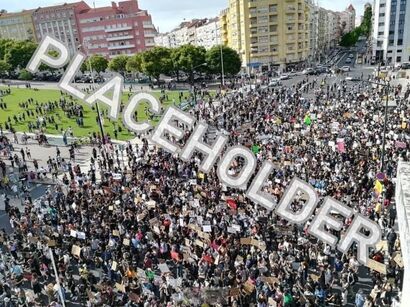Gran Aligonian crisis (2019-present)
This article is incomplete because it is pending further input from participants, or it is a work-in-progress by one author. Please comment on this article's talk page to share your input, comments and questions. Note: To contribute to this article, you may need to seek help from the author(s) of this page. |
| 2019-2020 Gran Aligonian crisis | |||
|---|---|---|---|
 | |||
| Date | October 2019 - Present | ||
| Location | |||
| Caused by |
| ||
| Goals |
| ||
| Methods |
| ||
| Status | Ongoing | ||
| Parties to the civil conflict | |||
| |||
| Lead figures | |||
| |||
| Fined | Approximately 11,000 protestors, foreign nationals, and other dissidents | ||
| a. refers only to the insurgent actions of Archbishop Hugo Marin | |||
The 2019-20 Gran Aligonian crisis, also referred to internally as the Abdication Crisis (Aligonian: Crise de Abdicación), is an ongoing political upheaval on the island-nation of Gran Aligonia. Catalyzed by a labor protest held by the Aligonian Migrant Worker’s League in October 2019, the protest soon became far larger and more diverse, drawing on common criticisms of Gran Aligonia’s then-monarchical system of government that had been building over the past several decades.
Origins
Gran Aligonia entered into the 20th century a Principality, created after the demise of the long-lived Most Magnificent Republic of Aligonia. The ruling house of Oberlia had inherited the powerful system of trading posts and island possessions; however, they became increasingly controversial during the first West Scipian Wars; Gran Aligonia was subsequently occupied by Yisrael before the third. Inside the Yisraeli administration, several houses of the Principality's nobility became promient bureaucrats and politicians, while others who preferred the then-polarized Belisarian power of Latium were persecuted as political dissidents and often staged a low-level, disorganized insurgency in certain more remote parts of the Archipelago.
The House of Abellán was one such house, and they had been the quickest of the Big Five political families to adapt to the new administration, gaining them much of the power vaccum that the exile of the Oberlias had created. Though the family was large, and old at the time, it had suffered losses in the 2nd West Scipian War, and thus the fourth son of its prominent head Relendo II Abellán, Octavio Abellán, became the sole heir to the family's estate. Simultaneously, the intermission of the 3rd West Scipian War was ending, and, seeing the end of the Autocracy regime, Octavio began negotiations with Latium and began meeting with the resistance in preparation for an eventual invasion and liberation of the Archipelago from Yisraeli rule, which happened in 1950. Part of the stipulations signed by Octavio involved a permanent treaty of Latin military protection, including the establishment of a large airbase at the city of Sidora. Though intended as a political deterrent against further aggression in the Periclean, after Gran Aligonia had become a prominent financial center and gambling haven in the 1960s, under Octavio's son Virxillio, sentiment had already begun to turn against the atmosphere of "Villa Romera extravagance", especially by the more rural vinyard communities, which were prominently tied to old money and the nobility. This growing dichotomy began to sour many prominent families' opinions of the Abelláns, and angered those both angry at their former collusion with the Yisraeli regime and angered at the end of Yisraeli rule.
Nevertheless, Virxillio had considerable economic policy talent, and managed to attract investment and increase living standards in Gran Aligonia, especially along the coast. Tourism boomed when a successful series of ad campagins painting Gran Aligonia as a natural paradise became successful. Nevertheless, income inequality soon became a problem, especially for the increasingly outcompeted rural nobility, who were slowly becoming outpaced politically and economically by rich liberal-minded citizens along the coasts, including a very large population of expats from Yisrael, Talahara, and Lihinidos, as well as Latin immigrants largely coalesced around the maintenence of the Sidora military base. In the 1990s, a nationalist sentiment began to come up in response to a boiling over of economic and social tensions related to these changes, often materializing in small, local forms of republicanism, technocratism, and Christian socialism; Various rebellious phenomoena, including Christian communes, New Age spirituality, and Punk rock also began to emerge, taking inspiration from the now-receding global leftist movements of the Open Fifties, New Society, and ______.